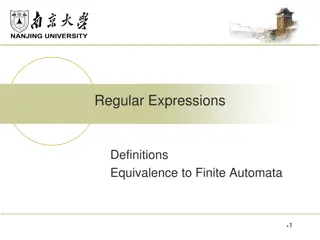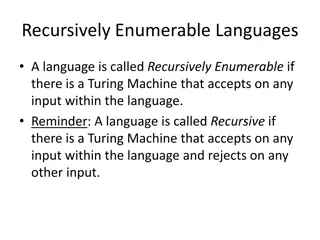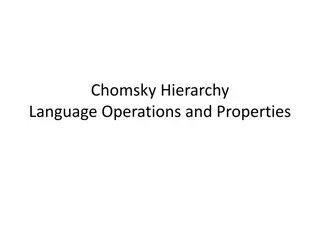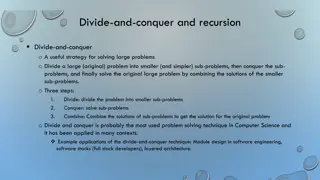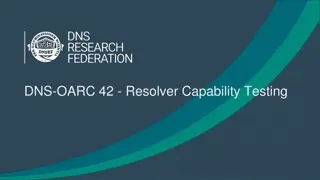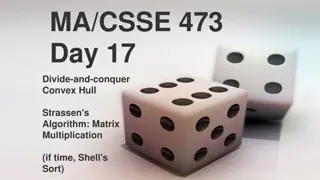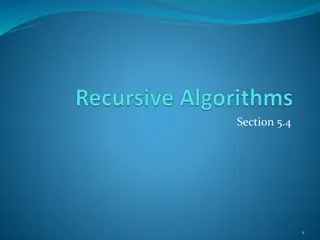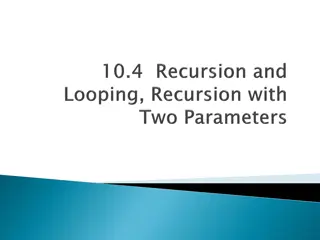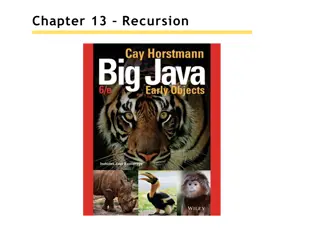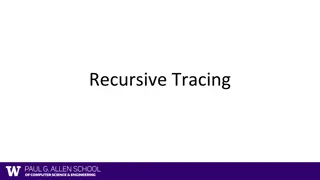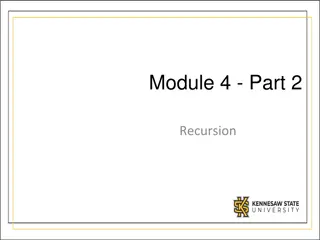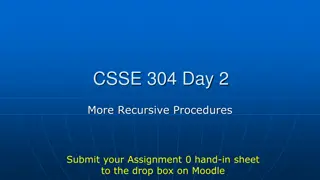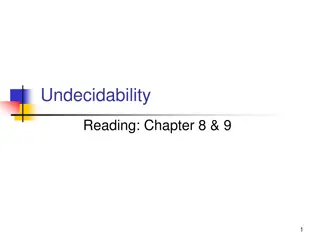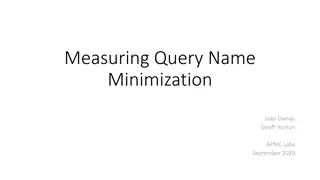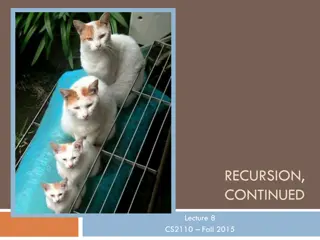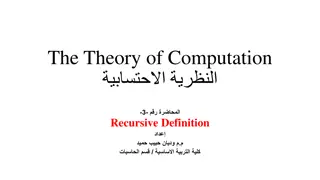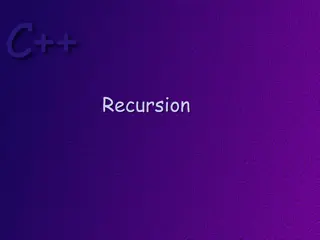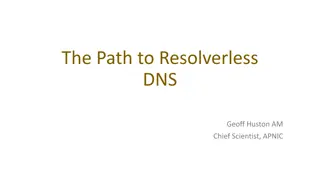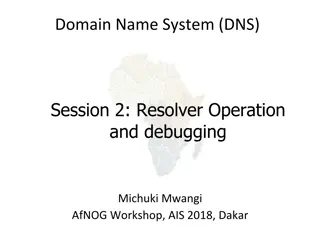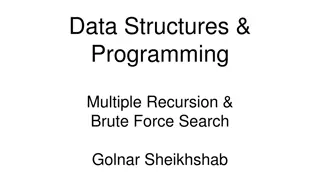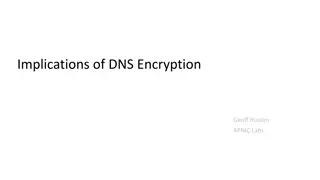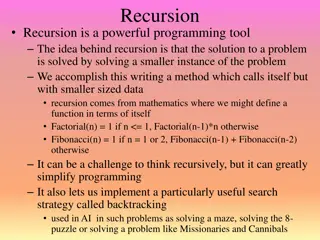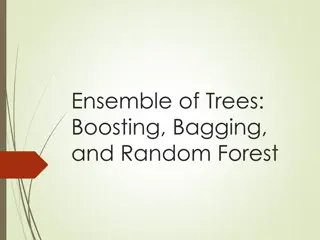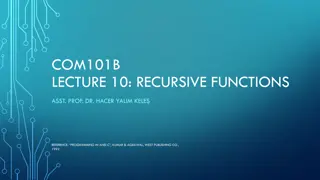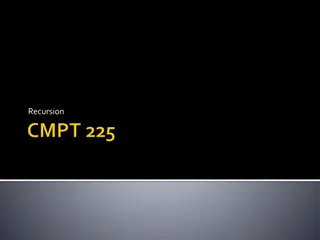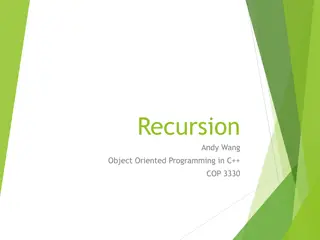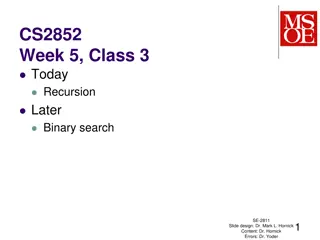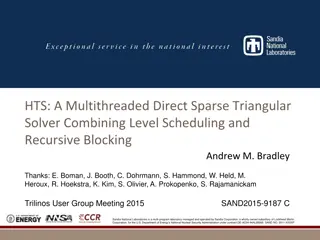Introduction to Regular Expressions and Equivalence to Finite Automata
Regular expressions (REs) are used to describe languages by algebra and are equivalent to finite automata. They define regular languages precisely using operations like union, concatenation, and Kleene star. The concatenation of languages combines strings from two languages, while the Kleene star re
9 views • 106 slides
Recursive vs Recursively Enumerable Languages
Comparison between recursive and recursively enumerable languages in terms of Turing Machines acceptance, decidable languages, recognizable languages, and partial predicates. Explains the concepts with examples and how Turing Machines decide membership in languages.
0 views • 8 slides
Chomsky Hierarchy in Language Theory
Explore Chomsky Hierarchy in language theory, including different types of languages, grammars, and automata. Learn how to prove if a language is regular, context-free, recursive, or recursively enumerable. Understand the closure properties of regular, context-free, recursive, and recursively enumer
3 views • 10 slides
Tower of Hanoi Puzzle and its Recursive Solution
Tower of Hanoi is a classic game involving moving disks between three pegs, following specific rules. This article provides an introduction to the game, notations used, recursive approaches to solve it, and a detailed walkthrough for N=2 and N=3 scenarios. Explore the recursive steps, time complexit
0 views • 12 slides
Divide and Conquer: A Strategy for Problem Solving
Divide-and-conquer is a powerful problem-solving technique in Computer Science where a large problem is divided into smaller sub-problems, conquered individually, and then combined to solve the original problem. Through three steps - Divide, Conquer, and Combine - complex problems can be efficiently
3 views • 18 slides
DNS Research Federation: Advancing Understanding of Cybersecurity Impact
The DNS Research Federation, a UK non-profit organization, aims to advance the understanding of the Domain Name System's impact on cybersecurity, policy, and technical standards through education, research, and improved data access. Motivated by the need to measure resolver capabilities, they have d
0 views • 17 slides
DNS Firewall Architecture at Virginia Tech
Virginia Tech implements Response Policy Zone (RPZ) as a mechanism in the DNS system to protect clients from malicious domains. The RPZ allows recursive resolvers to customize responses for specific zones, enhancing security against malware callbacks. Working with campus partners, the RPZ database a
0 views • 11 slides
Algorithms: Convex Hull, Strassen's Matrix Multiplication, and More
Explore various divide-and-conquer algorithms including Convex Hull, Strassen's Matrix Multiplication, and Quickhull. Understand the concepts of Sorting, Closest Pairs, and Efficiency in algorithm design. Discover efficient techniques such as recursive calculations and simplifications to enhance alg
1 views • 20 slides
Merge Sort Algorithm in Computer Science
Explore the concept of the merge sort algorithm as a practical example of tree recursion. Learn how merging works, the steps involved in the merge algorithm, and how recursive merge sort can efficiently sort unsorted lists. Dive into the recursive implementation of merge sort and grasp its recursive
0 views • 22 slides
Mathematical Analysis of Algorithms in CMPE371 - Fall 2023-2024
Explore the mathematical analysis of algorithms in CMPE371 for Fall 2023-2024, focusing on non-recursive and recursive algorithms. Learn how to analyze non-recursive algorithms by deciding on input size parameters, identifying basic operations, and simplifying summations. Dive into recursive algorit
1 views • 31 slides
Recursive Algorithms in Computing
Explore recursive algorithms in computing, including the definition, examples like factorial, exponentiation, GCD, and modular exponentiation. Dive into the concept of solving problems by breaking them into smaller instances, ensuring termination with known solutions.
0 views • 16 slides
Recursive Functions in Programming
Recursive functions in programming are powerful tools that can be used to solve complex problems by breaking them down into smaller, more manageable sub-problems. This content explores how recursive methods can be implemented using examples like the pool rack and division functions, showcasing the c
0 views • 15 slides
The Magic of Recursion in Programming
Discover the power of recursion in programming through insightful insights and examples. Explore recursive algorithms, methods, and the significance of believing in yourself as a programmer. Understand the crucial roles of arguments and parameters in methods, and delve into the intricacies of how me
0 views • 77 slides
Upgrade Requirements, Challenges, and Solutions for Same-Server DoT Implementation
Explore the transition from Do53 to DoT without changing resolvers, addressing challenges in DNS resolvers, TLS standards, and forwarder complications. Discover partial solutions through DANE TLSA certificates, DNS zone publishing, and DNSSEC trust anchors for enhanced security and upgrade process e
0 views • 14 slides
Recursion in Computer Science
Exploring the concept of recursion in computer science, this chapter delves into its applications, advantages, and efficiency. From understanding recursive helper methods to analyzing problems suited for recursive solutions, this chapter covers the fundamental principles of recursion using examples
0 views • 86 slides
Recursive and Iterative Factorials through Tracing
This content provides an in-depth exploration of recursive and iterative factorial functions through tracing examples. The explanations are accompanied by visual aids to help conceptualize the iterative and recursive processes of calculating factorials. By comparing the two methods side by side, rea
0 views • 7 slides
Recursion in Programming
Recursion in programming involves a method calling itself to solve problems by breaking them down into simpler subproblems. The process requires a base condition, recursive calls, and progress towards termination. This technique is illustrated through examples like calculating factorials using recur
0 views • 64 slides
CSSE 304 Day 2 - Recursive Procedures and Assignment Submission
Explore the concepts of recursion in CSSE 304 Day 2, including writing recursive procedures, finding starting code, running tests, and solving tasks like finding medians and counting occurrences. Join breakout rooms for more practice and don't forget to submit your assignment on Moodle.
0 views • 8 slides
Recursive and Recursively Enumerable Languages
Exploring the concepts of decidability and undecidability in computer science, specifically focusing on Recursive and Recursively Enumerable (RE) languages. Recursive languages always halt, while RE languages may or may not halt, showcasing the differences between decidable and undecidable problems.
0 views • 35 slides
Query Name Minimization in DNS Resolution
Delve into the world of query name minimization in DNS resolution, examining its adoption from the perspectives of end users, queries, and recursive resolvers. Understand the common resolver implementations and the techniques described in RFC 7816. Gain insights from user measurements and results fr
0 views • 18 slides
Top-Down Parsing in Context-Free Syntax
Context-free syntax expressed with context-free grammar plays a key role in top-down parsing. This parsing method involves constructing parse trees from the root down to match an input string by selecting the right productions guided by the input. Recursive-descent parsing, Rule Sentential Forms, an
0 views • 17 slides
Divide and Conquer Algorithms in Computer Science
In the recent lecture, we revisited topics such as the exam review, data compression, and mergesort. We also delved into a captivating puzzle set on the planet Og, exploring the logic behind truth-telling and lying natives. Furthermore, we discussed the transformation of recursive functions into non
2 views • 36 slides
Recursive Methods: A Comprehensive Guide
This content delves into the concept of recursion, particularly focusing on understanding recursive methods and how they are executed. It provides steps to approach recursive methods effectively, emphasizing the importance of having a precise specification and verifying correctness in base and recur
0 views • 14 slides
Introduction to Recursive Definitions in The Theory of Computation
Explore recursive definitions in the realm of computation theory through examples like defining sets of even numbers, factorial language, palindrome strings, and more. Learn how to prove properties using recursive rules and construct languages with specific patterns and constraints.
0 views • 10 slides
Recursion in Programming
Explanation of recursion in programming, including objectives, examples, and step-by-step breakdown. Learn how to design functions using recursion to solve problems effectively. Dive into the concept of recursive functions with a practical example of writing digits of an integer vertically. Explore
0 views • 53 slides
One-to-One and Recursive Relationships in Data Modeling
Explore the concepts of one-to-one and recursive relationships in data modeling through images and explanations. Learn about labeling relationships, mapping foreign keys, and creating tables in MySQL Workbench. Dive into examples showcasing 1:1 relationships and recursive relationships, with insight
0 views • 43 slides
Resolverless DNS and its Implications
Resolverless DNS, as discussed by Geoff Huston, delves into the architecture and issues of the DNS system. It explores the impact of resolver caches on speed and predictability of resolution, the potential for filtering DNS content, and the significance of metadata collection. The evolution of DNS s
0 views • 30 slides
Domain Name System (DNS) Resolver Operation and Debugging
The session explores the operation of Domain Name System (DNS) resolvers, focusing on how resolvers work, caching, and querying authoritative nameservers. It delves into the process of resolving queries, locating authoritative nameservers, handling cache misses, and the hierarchical structure of DNS
0 views • 37 slides
Exploring Recursive Solutions and Brute Force Search
In this content, we delve into the realm of recursive solutions, particularly multiple recursions and the application of brute force search algorithms. The focus is on tackling problems such as the Four Queens Problem through recursive approaches with varying sub-problems. Code snippets in C++ shed
0 views • 16 slides
Implications of DNS Encryption
the evolution of DNS services, rise of open resolvers, interception risks, DNS over TLS, and future trends pointing towards application-specific name services. Understand the potential fragmentation and challenges in the DNS ecosystem.
1 views • 9 slides
The Path to Resolverless DNS
DNS system architecture, issues with speed and predictability, background on browser vendors and DNS leakage, usage statistics of different resolvers in the Internet. Discusses the use of unencrypted UDP in DNS queries.
0 views • 33 slides
Power of Recursion in Programming
Recursion is a powerful tool in programming, solving problems by breaking them down into smaller instances. It simplifies coding and enables algorithms like backtracking in AI. Learn how recursion works and see examples of implementing recursive solutions, like factorial calculations. Understand the
0 views • 46 slides
Ensemble of Trees: Boosting, Bagging, and Random Forest
Ensemble of Trees explores various tree-based methods such as CART, MARS, Boosting, Adaboost, Gradient Boosting, Bagging, and Random Forest. It delves into the concept of partitioning the feature space, fitting simple models in rectangles, recursive vs. non-recursive partitioning, regression trees,
0 views • 49 slides
Recursive Functions in ANSI C: Understanding the Basics
Recursion is a fundamental concept in programming, particularly in ANSI C. This content delves into recursive functions, showcasing examples of factorial and Fibonacci functions with explanations and recursive evaluations. It also discusses the iterative version of the Fibonacci sequence and explore
0 views • 9 slides
Recursive Functions in C Programming
Recursion in C allows functions to operate on themselves, leading to concise and understandable forms. This post covers examples of recursive functions like factorial and Fibonacci in C programming, exploring the concept and benefits of recursion over iteration.
0 views • 10 slides
Recursive Algorithms for Fibonacci Series
The Fibonacci series, generated through recursive algorithms, explores the growth pattern of pairs of rabbits in a field. By understanding the drawbacks of recursion and analyzing simple recursive algorithms, we delve into the essence of Fibonacci numbers. Discover how the series evolves each month
0 views • 80 slides
Recursion in C++ Programming
Recursion in C++ programming involves functions that call themselves to solve tasks efficiently. Learn about recursive functions, iterative approaches, comparisons, and examples like calculating factorials and Fibonacci numbers. Explore the efficiency and differences between iterative and recursive
0 views • 26 slides
Recursive Algorithms and Correctness
The concepts of recursion in algorithms, including recursive formulas, proving algorithm correctness, and solving problems recursively. Dive into recursive method implementation, debugging techniques, and the significance of termination cases. Gain insights into the iterative process of validating r
0 views • 11 slides
Investigating Recursive Sequences
Today's exploration focuses on understanding and working with recursive sequences in mathematics. Learn about explicit and recursive equations, analyze sequences, and solve problems to enhance your skills in sequences and series.
0 views • 6 slides
HTS: A Multithreaded Direct Sparse Triangular Solver
This article discusses a multithreaded direct sparse triangular solver that combines level scheduling and recursive blocking techniques. The problem statement, solution approach, algorithms, and implementation details are covered, focusing on efficiency in handling sequential RHS with the same nonze
0 views • 18 slides
